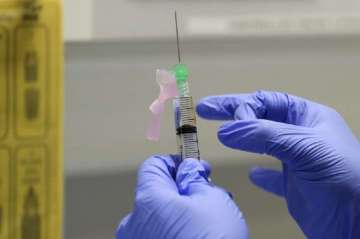Covishield row with UK: Both sides engage in talks to clear out differences
Referring to the latest guidelines issued by the UK government that will come into effect on October 4, another UK officials had said that London does not have any problem with the Covishield vaccine but there are certain issues related to vaccine certification in India.

The Central government said that the UK's rule of 10-day quarantine for those vaccinated in India is 'discriminatory' as the it refused to provide relief of quarantine for Indian travellers despite recognising Covishield vaccine.
The UK government had earlier said that COVID-19 vaccine certification from all countries must meet a "minimum criteria" and that it is working with India on a "phased approach" to its international travel norms.
It follows Covishield, the Serum Institute of India manufactured Oxford/AstraZeneca vaccine, being added as eligible to an expanded UK travel advisory on Wednesday.
But with India’s vaccine certification not on a list of 18 approved countries, Indian travellers to the UK will continue to be treated as non-vaccinated and therefore required to quarantine for 10 days on arrival.
Following much confusion over this process, UK government sources said on Wednesday night that additions or changes to the approved country listings are being kept under "regular consideration", but there was no further clarity on the required criteria for approving a country's vaccine certification.
"As part of our recently expanded inbound vaccination policy, we recognise the following vaccines Pfizer BioNTech, Oxford AstraZeneca, Moderna and Janssen (J&J), for the purposes of international travel. This now includes the formulations AstraZeneca Covishield, AstraZeneca Vaxzevria and Moderna Takeda," a UK government spokesperson said.
"Our top priority remains protecting public health, and reopening travel in a safe and sustainable way, which is why vaccine certification from all countries must meet the minimum criteria taking into account public health and wider considerations. We continue to work with international partners, including India, to roll out our phased approach," the spokesperson said.
Travellers who are not fully vaccinated, or vaccinated in a country such as India currently not on the UK government’s recognised list, must take a pre-departure test, pay for day two and day eight PCR tests after arrival in England and self-isolate for 10 days, with an option to "test to release" after five days following a negative PCR test.
With reference to an outcry over India’s vaccination certification not being recognised despite Covishield being one of two main COVID-19 vaccines administered in India, UK government sources would only say that the rollout of its inbound vaccination programme to other countries and territories was always intended as a "phased approach", building on the success of pilots with the US and Europe.
The 18 countries currently on the UK government’s approved inbound vaccinations list besides the US and Europe include: Australia, Antigua and Barbuda, Barbados, Bahrain, Brunei, Canada, Dominica, Israel, Japan, Kuwait, Malaysia, New Zealand, Qatar, Saudi Arabia, Singapore, South Korea, Taiwan and the United Arab Emirates (UAE).
India, UK hold talks on vaccine certification process
Meanwhile, talks are being held in New Delhi between British officials and National Health Authority representatives, led by CEO R.S. Sharma, in an attempt to resolve India’s omission from this list.
"Excellent technical discussions with @rssharma @AyushmanNHA. Neither side raised technical concerns with each other’s certification process. An important step forward in our joint aim to facilitate travel and fully protect the public health of UK and India,” British High Commissioner to India Alex Ellis tweeted on Thursday.
From October 4, England's traffic light system of red, amber and green countries based on levels of COVID-19 risk is to be officially scrapped. However, despite Covishield now being recognised within the UK’s eligible vaccine formulations, it would not offer any advantage to Covishield-vaccinated Indian travellers planning a UK visit.
At a Global COVID summit hosted by US President Joe Biden on Wednesday, Prime Minister Narendra Modi reiterated that international travel should be made easier through “mutual recognition of vaccine certificates”.
"Covishield isn't the problem, the vaccination certificate is"
"We're clear Covishield is not a problem. The UK is open to travel and we're already seeing a lot of people going from India to the UK, be it tourists, business people or students," British High Commissioner Alex Ellis said in a statement on Wednesday.
"We have been having detailed technical discussions regarding certification, with the builders of the CoWIN app and the NHS app, about both apps. They're happening at a rapid pace, to ensure that both countries mutually recognise the vaccine certificates issued by each other," he said.
According to new rules, Indian travellers who received both doses of the Covishield vaccine produced by the Serum Institute of India will be considered unvaccinated and will have to undergo self-isolation for 10 days.
In a strong reaction, India had on Tuesday warned of "reciprocal measures" if the UK does not address its concerns over the new travel rules relating to COVID-19 vaccine certification with Foreign Secretary Harsh Vardhan Shringla describing these norms as "discriminatory".
Referring to the latest guidelines issued by the UK government that will come into effect on October 4, another UK officials had said that London does not have any problem with the Covishield vaccine but there are certain issues related to vaccine certification in India. The new British rules have triggered massive criticism in India.
External Affairs Minister S Jaishankar also took up the issue of Covishield-vaccinated travellers being required to quarantine in the UK with newly-appointed British Foreign Secretary Elizabeth Truss at a meeting in New York on Tuesday.
(with inputs from PTI)